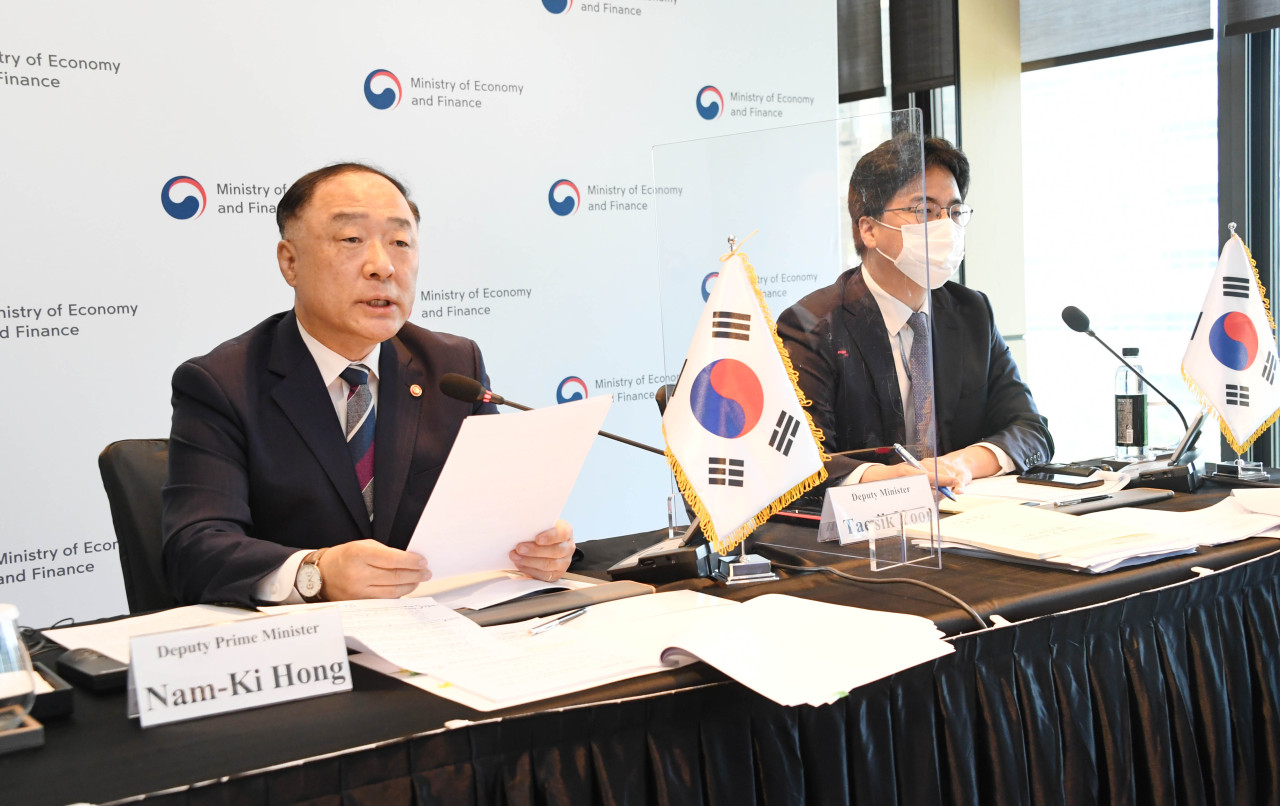
Finance Minister Hong Nam-ki (left) delivers the opening remarks at the ASEAN+3 Finance Ministers’ and Central Bank Governors’ Meeting, which was held online at the Four Seasons Hotel Seoul, in Seoul on Monday. (Yonhap)
As uncertainties surrounding an uneven economic revival from the COVID-19 pandemic linger in the Asian region, top economic policymakers and central bank chiefs from South Korea, China and Japan on Monday pledged to maintain an open trade regime and strengthen regional cooperation.
“The regional outlook has improved, with continued policy support and growing vaccine coverage. However, we should remain vigilant as the economic recovery has been uneven across and within member economies, uncertain and subject to elevated downside risks,” they said in a joint statement released after their trilateral meeting, which was held virtually.
The meeting was attended by Korean Finance Minister Hong Nam-ki and Bank of Korea Gov. Lee Ju-yeol, as well as their Chinese and Japanese counterparts.
While seeking to achieve an inclusive recovery and sound financial stability in each nation by shifting the benefits of supportive measures from the general population to the groups most affected by the coronavirus, the three countries will remain resolute in their “commitment to uphold an open and rules-based multilateral trade and investment system,” according to the statement.
In April, the International Monetary Fund upgraded its growth forecast for the broader Asia-Pacific region from 7.3 percent to 7.6 percent for this year, citing advanced economies such as Korea and Japan as key drivers of the sanguine outlook.
The agency, however, revised down its economic growth projection for the five largest developing economies in Southeast Asia to 4.9 percent from 5.2 percent due to a rise in the number of COVID-19 cases and renewed lockdowns. The countries are Indonesia, Malaysia, the Philippines, Thailand and Vietnam, all members of the Association of Southeast Asian Nations.
The policymakers stressed the importance of ensuring the operational readiness of the Chiang Mai Initiative Multilateralization, a multilateral currency swap arrangement with total financing capacity of $240 billion launched among the 10 members of ASEAN along with Korea, China and Japan to help address the short-term liquidity difficulties in the region.
“Given the emerging needs to respond to the structural challenges and their profound implication to regional economic and financial stability, we will explore new initiatives to strengthen the ASEAN+3 Regional Financial Safety Net,” they said in the statement.
They also reaffirmed strong support for the ASEAN+3 Macroeconomic Research Office while lauding the agency’s continued efforts to help members achieve a sustained recovery and economic stability by providing timely analysis, risk assessments and policy recommendations.
At the meeting of the ASEAN+3 Finance Ministers and Central Bank Governors, which was held later in the day, the leaders called for the early implementation of Regional Comprehensive Economic Partnership, the world’s largest free trade deal, signed by 15 countries including Australia and New Zealand in November 2020.
They said the deal will help strengthen economic linkages and enhance trade- and investment-related activities.
During the trilateral meeting, the finance minister told his counterparts that the country will continue with expansionary fiscal policy until the economy gets back on track and will push for the Korean green new deal in pursuit of sustainable growth through the development of the renewable energy sector.
Close cooperation among the three nations will create the strong synergy needed to tackle pending issues they have in common, such as climate change and the restoration of multilateralism, as well as low birth rates and aging populations, he added.
The next meetings of the financial chiefs will take place in Colombo, Sri Lanka, in 2022.
By Park Han-na (
hnpark@heraldcorp.com)






![[Graphic News] More Koreans say they plan long-distance trips this year](http://res.heraldm.com/phpwas/restmb_idxmake.php?idx=645&simg=/content/image/2024/04/17/20240417050828_0.gif&u=)